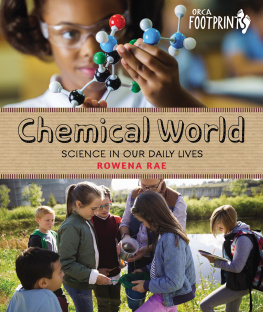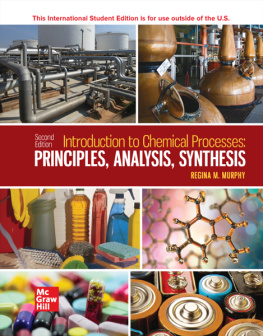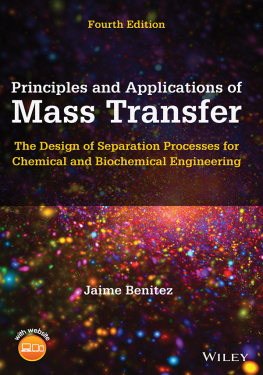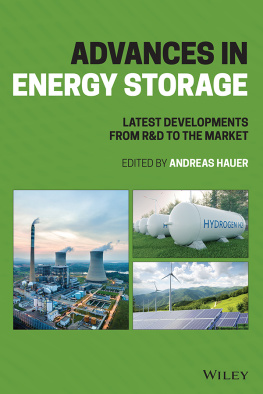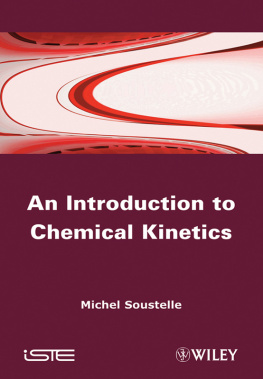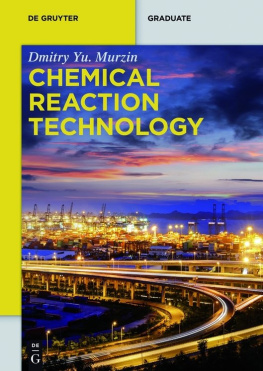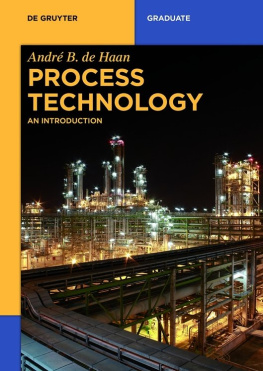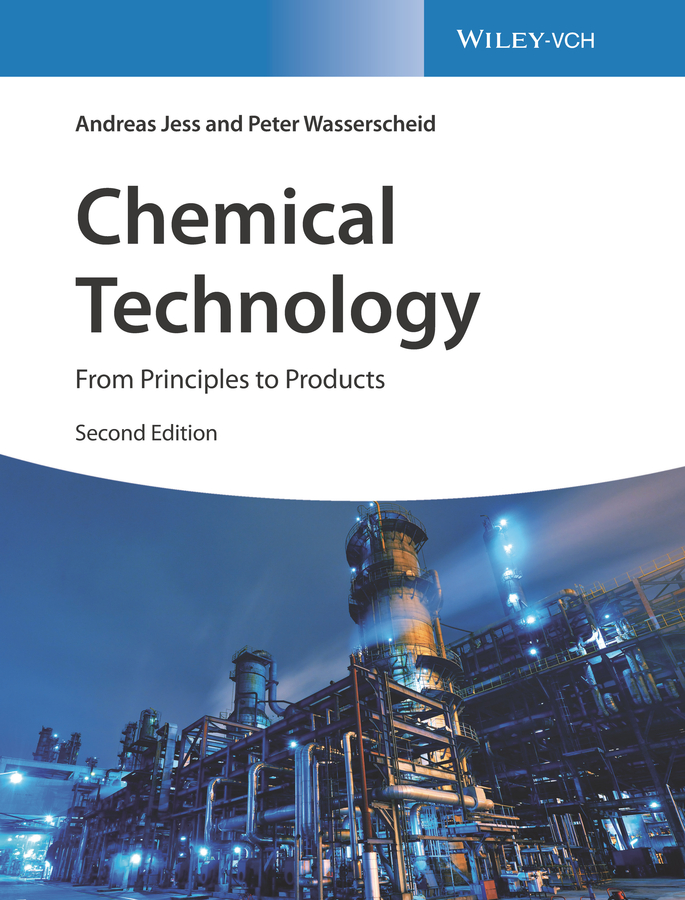
Table of Contents
List of Tables
- Notation
- Chapter 1
- Chapter 2
- Chapter 3
- Chapter 4
- Chapter 5
- Chapter 6
List of Illustrations
- Chapter 1
- Chapter 2
- Chapter 3
- Chapter 4
- Chapter 5
- Chapter 6
Guide
Pages
Related Titles
Arpe, H.-J.
Industrial Organic Chemistry
2010
ISBN: 978-3-527-32002-8
Atkins, P., de Paula, J., Keeler, J.
Physical Chemistry
2017
ISBN: 978-0-19-108255-9
Baerns, M., Behr, A., Brehm, A., Gmehling, J., Hinrichsen, K.-O., Hofmann, H., Onken, U., Palkovits, R., Renken, A.
Technische Chemie
2013
ISBN: 978-3-527-33072-0
Bartholomew, C.H., Dorazio, L., Farrauto, J.
Introduction to Catalysis and Industrial Catalytic Processes
2016
ISBN: 978-1-118-45460-2
Bertau, M., Mueller, A., Froehlich, P., Katzberg, M.
Industrielle Anorganische Chemie
2013
ISBN: 978-3-527-33019-5
(to be released as English-language version in 2019; ISBN: 978-3-527-33920-4)
Emig, G., Klemm, E.
Chemische Reaktionstechnik
2017
ISBN: 978-3-662-49267-3
Froment, G. F. / Bischoff, K. B. / De Wilde, J.
Chemical Reactor Analysis and Design
2010
ISBN: 978-0-470-56541-4
Green, M. M., Wittcoff, H. A.
Organic Chemistry Principles and Industrial Practice
2003
ISBN: 978-3-527-30289-5
Hagen, J.
Industrial Catalysis - A Practical Approach
2015
ISBN: 978-3-527-33165-9
Levenspiel, O.
Chemical Reaction Engineering
1998
ISBN: 978-0-471-25424-9
Moulijn, J. A., Makkee, M., van Diepen, A.
Chemical Process Technology
2013
ISBN: 978-1-4443-2025-1
Rothenberg, G.
Catalysis, Concepts and Green Applications
2008
ISBN: 978-3-527-31824-7
Schaub, G., Turek, T.
Energy Flows, Material Cycles and Global Development
2016
ISBN: 978-3-319-29493-3
Chemical Technology
From Principles to Products
Andreas Jess and Peter Wasserscheid
Second Edition

The Authors
Prof. Dr.-Ing. Andreas Jess
Universitt Bayreuth
Lehrstuhl fr Chemische
Verfahrenstechnik
Universittsstrae 30
95447 Bayreuth
Germany
Prof. Dr. Peter Wasserscheid
Universitt Erlangen-Nrnberg
Lehrstuhl fr Chemische
Reaktionstechnik
Egerlandstrae 3
91058 Erlangen
Germany
Cover Credit: iStock / zorazhuang / ID:582256640
Image Description: Oil Refinery, Chemical & Petrochemical plant, abstract, at night.
All books published by Wiley-VCH are carefully produced. Nevertheless, authors, editors, and publisher do not warrant the information contained in these books, including this book, to be free of errors. Readers are advised to keep in mind that statements, data, illustrations, procedural details or other items may inadvertently be inaccurate.
Library of Congress Card No.: applied for
British Library Cataloguing-in-Publication Data
A catalogue record for this book is available from the British Library.
Bibliographic information published by the Deutsche Nationalbibliothek
The Deutsche Nationalbibliothek lists this publication in the Deutsche Nationalbibliografie; detailed bibliographic data are available on the Internet at http://dnb.d-nb.de.
2020 Wiley-VCH Verlag & Co. KGaA, Boschstr. 12, 69469 Weinheim, Germany
All rights reserved (including those of translation into other languages). No part of this book may be reproduced in any form by photoprinting, microfilm, or any other means nor transmitted or translated into a machine language without written permission from the publishers. Registered names, trademarks, etc. used in this book, even when not specifically marked as such, are not to be considered unprotected by law.
Cover DesignAdam-Design, Weinheim, Germany
Print ISBN: 978-3-527-34421-5
ePDF ISBN: 978-3-527-81564-7
ePub ISBN: 978-3-527-81566-1
To our wives Christina and Talke and our children Antonia, Friederike, Jonathan, Karolin, Lukas, and Theresa.
Preface of First Edition (and Guidelines How to Use This Textbook)
This textbook tries to marry the four disciplines of chemical technology, namely, chemistry (key reactions, catalysis), thermal and mechanical unit operations (distillation, absorption/adsorption, mixing of fluids, separation of solids from fluids, etc.), chemical reaction engineering (thermodynamics, kinetics, influence of heat and mass transfer, reactor modeling), and general chemical technology, that is, the pedigree of routes from raw materials via intermediates to final products and environmental aspects of chemical technology.
The development and understanding of chemical processes relies on knowledge of all four disciplines. This book is an approach to integrating these disciplines and to enlivening them by problems and solutions of industrial practice. The book intends to enable students of chemical engineering as well as of chemistry (especially those with a focus on technical chemistry) to understand industrial processes and to apply these fundamental disciplines for the design of reactors, including pre- and posttreatment of feedstocks and products.
We emphasize that the depth of specialist literature cannot and should not be reached; but students who want to study certain aspects in more detail will find further references.
The book is organized into three main parts:
- The first half provides a comprehensive examination of the fundamental disciplines of chemical technology: after a short introduction, the subsequent chapters survey chemical aspects ().
- gives an overview of raw materials and energy sources (fossil fuels, renewable energy), in which economical, ecological, and social aspects of energy consumption are also covered. Thereafter, the routes from fossil fuels (natural gas, oil, and coal) to fuels, petrochemicals, bulk chemicals, and final products are described, and the main inorganic intermediates and final products are also given. Finally, some main environmental aspects of chemical technology (air and water pollution) and the costs of manufacturing fuels and chemicals are discussed.
- In the last part () and will extend them to industrial practice. The processes have been selected such that they all differ with respect to at least one important aspect like the type and design of the reactor, the chemistry involved, or the separation process used.
The book is supplemented by a brief survey of selected modern trends such as microreactors, and new solvents for catalysis like ionic liquids, which should convince the reader that chemical technology is not a completed discipline, but a developing field with huge future challenges such as solving the energy problems for generations to come.
Several chapters are based on bachelor and master courses the authors have taught students of chemistry and of chemical engineering at different universities for many years (Aachen, Bayreuth, Erlangen, Karlsruhe). We have tried to consider the challenges specific to instructing chemists and engineers in chemical technology; for example, the problems both groups have in integrating the different disciplines: according to our experience, chemists tend to be too anxious with regard to chemical engineering methods (and most notably with the mathematics involved). In contrast, engineers often feel uncomfortable if chemical aspects have to be examined and come to the fore.
Next page

